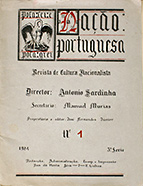

................................
In their programme of historical revisionism, the integralists claimed Portuguese roots and an originality of their own, based on the collection of the political and cultural tradition of 19 th -century national counter-revolutionary thought. They were inspired by and mentioned the Portuguese counter-revolutionary and legitimist masters, considering themselves as followers of Almeida Garrett's disillusionment (Fernando Campos, "No Saguão do Liberalismo / I O Desengano de Garrett" [In the Porch of Liberalism/ I Garrett's Deception], series VI, 1931) and the place he gave to national character of all culture; Alexandre Herculano's disillusionment and criticism of the centralisation of power (Hipólito Raposo, "A voz do profeta " [The prophet's voice], no. 2, 1914 and Fernando Campos, "No Saguião do Liberalismo /A desilusão de Herculano", series VI, 1931); Antero de Quental's non-conformism; Teófilo Braga's popular foundations of the monarchy; Eça de Queiroz's irony (António Álvaro Dória , "A obra de Eça de Queiroz" [The work of Eça de Queiróz ] vol. VII, 1931-32); the satire of liberal parliamentarianism by Eça de Queiroz and Ramalho Ortigão (Fernando Campos, "No Saguião do Liberalismo/ A Penitência de Ramalho" [ Ramalho's Penitence ], vol. VII, 1933 and João Ameal, "Ramalho Ortigão/Apóstolo da Saúde Portuguesa" [Ramalho Ortigão/ Apostle of Portuguese Health ], vol. X, 1936); the pessimism and nationalism of Oliveira Martins (Fernando Campos, "No Saguião do Liberalismo/IV O pessimismo de Oliveira Martins" [ The pessimism of Oliveira Martins], vol. VII, 1932); the politological importance of Sebastianism detected by Sampaio Bruno and Lúcio de Azevedo; and the importance of Portuguese educators by Ferreira Deusdado (Ferreira Deusdado, "O Espírito Mediévico e o Espírito Humanista" [ The Medievist Spirit and the Humanist Spirit ], no. 1, 1926) and the contrition of Fialho de Almeida ("Fialho de Almeida ou as vitórias mutiladas" [Fialho de Almeida or the mutilated victories ], vol. XI, 1938). In other words, the theoreticians of the first integralist generation recovered the anti-liberal and counter-revolutionary ideology of the national 19th century, introducing into the Portuguese political culture the fundamental elements of the process of ideological legitimisation for the overthrowing of the First Portuguese Republic: a nationalist interpretation of Portuguese history, which emphasised the idea of Liberalism as a body foreign to Portuguese tradition and responsible for its decline.
This work is financed by national funds through FCT - Foundation for Science and Technology, I.P, in the scope of the projects UIDB/04311/2020 and UIDP/04311/2020.
